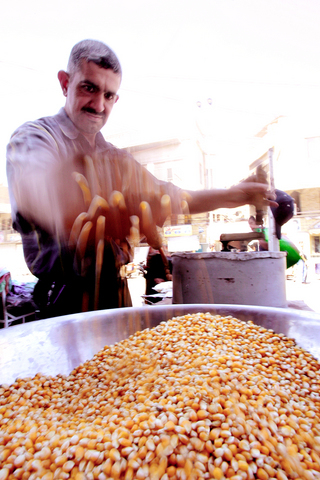US and Iraqi military forces clashed with armed gangs during a search operation yesterday in the southern Iraqi town of Diwaniyah, leaving 20 dead and a US main battle tank destroyed.
Clashes raged on overnight and sporadic gunfire continued into yesterday morning, when a curfew was imposed throughout the city.
"There was an attack last night in Diwaniyah in which three rocket propelled grenade teams attacked ... soldiers who were conducting combat operations," US-led coalition headquarters said in a statement.

PHOTO: AFP
Seven civilians were wounded in the clashes, one of them critically, local medics said. The US military reported no coalition casualties.
An Iraqi defense department official said the clashes erupted after a joint US-Iraqi force raided the home of Kifah al-Greiti, a local commander for the Mahdi Army of firebrand Shiite cleric Moqtada al-Sadr.
But military sources in Diwaniyah denied they had attempted to arrest the militia chief, insisting that a routine Iraqi army patrol had been ambushed, provoking a fierce gun and rocket-propelled grenade duel.
In August, Diwaniyah was the scene of fierce clashes between the Mahdi Army and the Iraqi army that resulted in at least 60 dead.
There were occasional flare ups last month.
"Our reports currently indicate that a CF [coalition forces] tank was destroyed during clashes last night with insurgents," said a coalition spokesperson. "The tank destroyed was a M1A2 second generation Abrams."
US armored vehicles such as the Abrams are almost immune to the typical roadside booby-traps employed by Iraq's militias and insurgent groups.
But commanders have warned that more sophisticated devices are being smuggled from Iran.
According to US officials, within the region this technology is exclusively Iranian and only found in the possession of Shiite militias.
Coalition forces in Baghdad have recently been conducting exploratory forays into district near the Shiite militia bastion of Sadr City in Baghdad but have yet to receive Iraqi government approval for a full-scale entry.
In other Baghdad violence, a senior officer in the Iraqi police internal affairs department was shot dead in Baghdad yesterday, just five days after an entire police brigade was accused of colluding with sectarian death squads.
Security officials identified the victim as Colonel Tamer Salman, assistant to the director of police internal affairs, an increasingly important unit at a time when the government is under pressure to purge disloyal officers.
Iraq's fledgling police force has been accused of taking sides in the country's increasingly brutal sectarian war, with Shiite-dominated units said to allow militia fighters to attack Baghdad's Sunni minority.
Other attacks around Baghdad yesterday included a mortar attack in Waziriyah in central Baghdad on a police patrol which killed one policeman and wounded another, as well as a bystander.
South of the capital, in the restive Babil province, police discovered a corpse lying by the side of the road but when they attempted to move it, gunmen opened fire on them, wounding a policeman.
The central Iraqi province of Salaheddin witnessed the death of four civilians near former leader Saddam Hussein's home village when their car struck roadside bomb.

Kehinde Sanni spends his days smoothing out dents and repainting scratched bumpers in a modest autobody shop in Lagos. He has never left Nigeria, yet he speaks glowingly of Burkina Faso military leader Ibrahim Traore. “Nigeria needs someone like Ibrahim Traore of Burkina Faso. He is doing well for his country,” Sanni said. His admiration is shaped by a steady stream of viral videos, memes and social media posts — many misleading or outright false — portraying Traore as a fearless reformer who defied Western powers and reclaimed his country’s dignity. The Burkinabe strongman swept into power following a coup in September 2022

‘FRAGMENTING’: British politics have for a long time been dominated by the Labor Party and the Tories, but polls suggest that Reform now poses a significant challenge Hard-right upstarts Reform UK snatched a parliamentary seat from British Prime Minister Keir Starmer’s Labor Party yesterday in local elections that dealt a blow to the UK’s two establishment parties. Reform, led by anti-immigrant firebrand Nigel Farage, won the by-election in Runcorn and Helsby in northwest England by just six votes, as it picked up gains in other localities, including one mayoralty. The group’s strong showing continues momentum it built up at last year’s general election and appears to confirm a trend that the UK is entering an era of multi-party politics. “For the movement, for the party it’s a very, very big

ENTERTAINMENT: Rio officials have a history of organizing massive concerts on Copacabana Beach, with Madonna’s show drawing about 1.6 million fans last year Lady Gaga on Saturday night gave a free concert in front of 2 million fans who poured onto Copacabana Beach in Rio de Janeiro for the biggest show of her career. “Tonight, we’re making history... Thank you for making history with me,” Lady Gaga told a screaming crowd. The Mother Monster, as she is known, started the show at about 10:10pm local time with her 2011 song Bloody Mary. Cries of joy rose from the tightly packed fans who sang and danced shoulder-to-shoulder on the vast stretch of sand. Concert organizers said 2.1 million people attended the show. Lady Gaga

SUPPORT: The Australian prime minister promised to back Kyiv against Russia’s invasion, saying: ‘That’s my government’s position. It was yesterday. It still is’ Left-leaning Australian Prime Minister Anthony Albanese yesterday basked in his landslide election win, promising a “disciplined, orderly” government to confront cost-of-living pain and tariff turmoil. People clapped as the 62-year-old and his fiancee, Jodie Haydon, who visited his old inner Sydney haunt, Cafe Italia, surrounded by a crowd of jostling photographers and journalists. Albanese’s Labor Party is on course to win at least 83 seats in the 150-member parliament, partial results showed. Opposition leader Peter Dutton’s conservative Liberal-National coalition had just 38 seats, and other parties 12. Another 17 seats were still in doubt. “We will be a disciplined, orderly